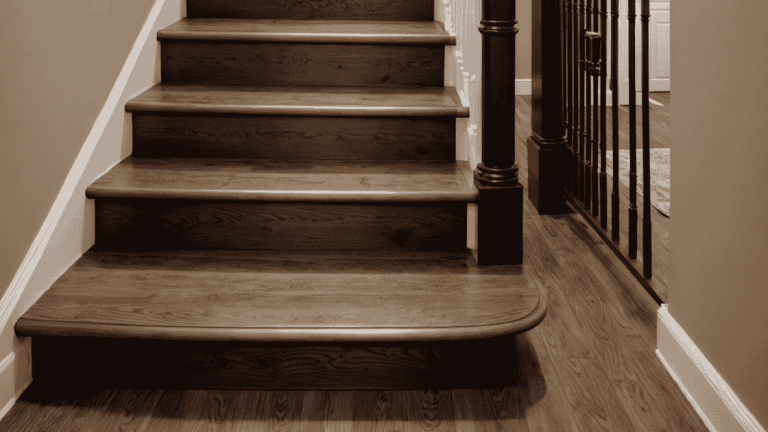Cork Flooring Review: Benefits, Cost, Pros and Cons
Cork flooring is rapidly gaining popularity as a versatile and eco-friendly choice for modern interiors. Renowned for its unique combination of comfort, aesthetics, and sustainability, cork flooring offers a distinct appeal that sets it apart from traditional flooring materials.
Whether you’re looking for a cozy upgrade for your living room or a practical option for high-traffic areas, cork flooring delivers on both style and functionality. In this guide, we’ll explore everything you need to know about cork flooring, from its benefits to its drawbacks, installation, and care.

What is Cork Flooring?
| # | Preview | Product | |
|---|---|---|---|
| 1 |

|
Eco Cork Foam Floor Underlayment - Floor Padding for Vinyl Plank Flooring, LVP Flooring, Hardwood... | Check Price on Amazon |
Cork flooring is crafted from the bark of the cork oak tree, a renewable resource primarily harvested in Mediterranean countries. Unlike traditional logging, cork harvesting involves stripping the bark without harming the tree, allowing it to regenerate over time. This process makes cork one of the most sustainable materials available.
The harvested bark is ground into granules, mixed with resins, and compressed into sheets or tiles, which are then used to produce flooring. Cork flooring comes in two primary types:
- Floating Cork Flooring: Pre-assembled planks with a click-lock mechanism.
- Glue-Down Cork Tiles: Flexible tiles that adhere directly to the subfloor.
With its natural resilience and wide array of finishes, cork flooring suits a variety of interior design styles.
Benefits of Cork Flooring
Eco-Friendly and Sustainable
Cork is a renewable material harvested without damaging trees, and its production has a low environmental impact. Additionally, cork oak forests play a vital role in biodiversity and carbon absorption, making cork flooring a climate-friendly option.
Comfort and Insulation
The cellular structure of cork provides a natural cushion underfoot, reducing strain on joints and making it ideal for areas where you stand for extended periods, like kitchens. Cork also offers excellent thermal and acoustic insulation, keeping rooms quiet and warm.
Durability and Resilience
Cork is surprisingly durable, with natural elasticity that allows it to resist dents and recover from compression. It is also hypoallergenic and resistant to mold, mildew, and pests, making it a healthy choice for homes.
Aesthetic Appeal
Modern cork flooring comes in a range of patterns, textures, and colors, from natural earthy tones to bold, contemporary designs. Its versatility allows it to complement a variety of decor styles, from rustic to minimalist.
Health and Safety
Cork flooring is non-toxic and free of harmful chemicals, making it safe for families with children and pets. Additionally, cork has fire-resistant properties, which can contribute to overall home safety.
Drawbacks to Consider:
While cork flooring offers numerous advantages, it’s not without its downsides:
- Cost: Cork flooring can be more expensive upfront compared to vinyl or laminate.
- Moisture Sensitivity: In areas with high humidity or potential water exposure, cork can swell or warp without proper sealing.
- Maintenance: Regular sealing is required to maintain cork’s water resistance and longevity.
- Limited Industrial Use: Cork is not ideal for heavy-duty industrial applications due to its softer nature.
Pros and Cons of Cork Flooring:
| Aspect | Pros | Cons |
|---|---|---|
| Eco-Friendliness | Made from renewable cork oak bark; sustainable and biodegradable. | Limited moisture resistance; may require sealing for durability in wet environments. |
| Comfort | Soft and cushioned surface reduces strain on feet and joints. | Can show dents from heavy furniture or sharp objects over time. |
| Insulation | Excellent thermal and sound insulation properties. | Vulnerable to expansion and contraction in very humid conditions. |
| Health Benefits | Naturally hypoallergenic; resistant to mold, mildew, and pests. | Prolonged sun exposure may cause fading; UV coatings required to prevent discoloration. |
| Durability | Resilient to impacts and compressions; naturally fire-resistant. | Softer than other flooring types, making it unsuitable for heavy-duty or industrial use. |
| Aesthetic Appeal | Wide variety of patterns, colors, and finishes to suit diverse interior styles. | Can fade in areas exposed to constant sunlight without protective coatings. |
| Maintenance | Low maintenance; occasional sealing enhances longevity and water resistance. | Requires periodic sealing to protect against water and stains. |
| Cost | Long-term cost-effective due to durability and minimal maintenance needs. | Higher initial cost compared to vinyl or laminate flooring. |
| Installation | Floating planks are easy to install, making it DIY-friendly. | Glue-down tiles require professional installation for the best results. |
| Safety | Non-toxic and fire-resistant, making it safe for children and pets. | Not ideal for high-humidity environments like bathrooms unless properly sealed. |
Installation Methods
Floating Cork Flooring
Floating planks are easy to install and perfect for DIY enthusiasts. The planks click together without the need for adhesives, making installation quick and mess-free.
Glue-Down Cork Tiles
Glue-down tiles create a seamless finish and are ideal for spaces with high foot traffic. However, this method requires precise preparation and professional expertise for optimal results.
Maintenance and Care Tips
Cork flooring is relatively low maintenance but requires specific care to retain its beauty and durability:
- Regular Cleaning: Vacuum or sweep to remove dirt, and use a damp mop with a mild cleaner for deeper cleaning.
- Sealing: Periodically apply a sealant to enhance water resistance and protect against stains.
- Prevent Damage: Use furniture pads to avoid scratches and avoid dragging heavy items across the surface.
Applications of Cork Flooring
Cork flooring is a versatile choice that works well in a range of settings:
- Residential: Ideal for living rooms, kitchens, bedrooms, and playrooms due to its comfort and insulation properties.
- Commercial: Commonly used in yoga studios, offices, and retail spaces where comfort and quiet are priorities.

Comparing Cork Flooring to Other Flooring Options
Cork vs. Hardwood
Cork is more sustainable and comfortable than hardwood, with better insulation properties, though it may not match the prestige of traditional hardwood floors.
Cork vs. Vinyl/Tile
Unlike vinyl or tile, cork is an eco-friendly option with superior comfort and a softer feel. However, it may not be as water-resistant as tile without proper sealing.
Cork vs. Carpet
Cork is hypoallergenic and easier to maintain than carpet, offering a cleaner and more durable surface for busy households.
Comparing Cork Flooring to Other Flooring Options
| Feature | Cork Flooring | Hardwood Flooring | Vinyl/Tile Flooring | Carpet Flooring |
|---|---|---|---|---|
| Sustainability | Eco-friendly; renewable cork oak bark is harvested without damaging the tree. | Limited sustainability; involves logging and environmental impact. | Made from non-renewable materials like PVC or ceramics. | Often synthetic, with a lower environmental profile. |
| Comfort | Naturally soft and cushioned underfoot; reduces joint strain. | Hard surface; less comfortable for prolonged standing. | Hard and cold underfoot; minimal comfort. | Soft and plush; provides comfort but may flatten over time. |
| Insulation | Excellent thermal and sound insulation. | Moderate; depends on wood type and thickness. | Poor thermal insulation; good soundproofing with grout. | High sound and thermal insulation. |
| Durability | Resists dents; naturally mold- and mildew-resistant. | Long-lasting; prone to scratches and water damage. | Highly durable; water- and scratch-resistant. | Susceptible to stains, flattening, and wear in high-traffic areas. |
| Maintenance | Low; requires occasional sealing for water resistance. | High; regular polishing and scratch repairs needed. | Easy to clean with water and mild cleaners. | High; frequent vacuuming and stain treatment required. |
| Aesthetic Appeal | Wide variety of patterns, textures, and colors. | Timeless appeal with natural wood grains. | Imitates wood and stone; available in diverse styles. | Cozy and inviting, but limited design options. |
| Health and Safety | Hypoallergenic, non-toxic, and fire-resistant. | Hypoallergenic but may release VOCs from finishes. | May emit VOCs; some vinyl contains harmful substances. | Traps allergens and dust; not hypoallergenic. |
| Water Resistance | Moderate; sealing required for better resistance. | Low; warps and stains from moisture exposure. | High; water-resistant and ideal for wet areas. | Low; retains moisture, risking mold and mildew growth. |
| Ease of Installation | Easy; floating planks are DIY-friendly. | Professional installation needed. | DIY-friendly for vinyl; tile needs grouting. | Professional installation preferred for a seamless fit. |
| Lifespan | 10–30 years with proper care. | 20–100 years with maintenance. | 10–20 years for vinyl; tile lasts 50+ years. | 5–10 years depending on traffic and maintenance. |
| Cost | $3–$12 per sq. ft. | $5–$20+ per sq. ft. | $2–$15 per sq. ft. | $2–$8 per sq. ft., plus padding costs. |
Cost and Value
The cost of cork flooring varies depending on quality, thickness, and finish. Here’s a breakdown of typical price ranges:
| Type | Price Range (per sq. ft.) | Details |
|---|---|---|
| Floating Cork Flooring | $3 – $6 | Easy to install, DIY-friendly. |
| Glue-Down Cork Tiles | $4 – $8 | Seamless finish, requires professional expertise. |
| High-End/Custom Cork | $7 – $12+ | Designer patterns and premium durability. |
While cork flooring’s upfront cost may be higher than some alternatives, its durability, insulation benefits, and eco-friendliness offer excellent long-term value.
Final Thoughts: Is Cork Flooring Right for You?
Cork flooring combines sustainability, comfort, and style, making it an excellent choice for eco-conscious homeowners or those seeking a durable yet attractive flooring option. Its unique benefits, such as insulation and resilience, make it well-suited for family homes and commercial spaces alike.
If you’re considering cork flooring, visit a showroom or request samples to see how it fits your design vision. With proper installation and care, cork flooring can provide years of beauty and functionality.





